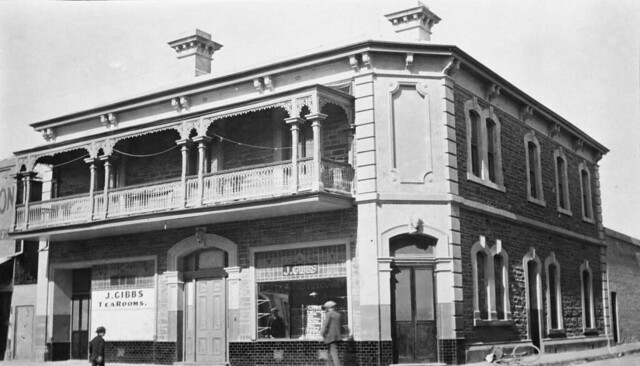Photo Library
Shakespeare Hotel, Waymouth Street, 1923
Photo taken 01 January 1923
State Library Catalogue Reference: B 1320
The former Shakespeare on the south-east corner of Waymouth Street and Cannon Street. Established as the Builders' Arms in 1856 and changed name in 1861 and remained so until it ceased trading as a hotel in 1921. This photograph shows the building in 1923 when it was used as tearooms. This 1879 building survives and is used as backpacker accommodation.
'WAYMOUTH STREET FRACAS
'These boys are what might be called the ringleaders of a gang of miscreants who congregate in Waymouth street,' said Mr. Seymour Smith, in opening a unique case at the Adelaide Police Court on Friday against six youths, charged with having disturbed the peace in the vicinity of the Shakespeare Hotel, Waymouth street, on November 15. The Bench was occupied by Messrs. T. Gepp, S.M., H. J. Pudney, W. T. Collins, and A. W. Richardson. The defendants were Michael Clarke, Harry Lewis, Barney Welsh, George Jennings, George Munro, and Frank Bailey, the last two of whom were defended by Mr. R. H. Lathlean. Mr. Smith continued that on the night of November 15 they were assembled together with a few companions outside the Lord Raglan Hotel, about 40 yards from the informant's premises. At about 3 minutes to 11, two men left the Shakespeare, and walked in an easterly direction towards King William street, and when near the Lord Raglan were surrounded by the defendants. One of the men was brutally assaulted, and the two ran back to the Shakespeare, followed by the hungry mob.
Mr.- Lathlean— Thirsty mob.
Yes, thirsty mob. The licencee was standing in her doorway. It was then one minute before closing time, and one of the men said, 'For God's sake, missus, protect me from this mob.' She admitted the men, and the crowd, 20 strong, immediately surrounded the door and prevented her from closing it. While she was pushing against the door Bailey struck her a violent blow under the jaw. Mrs. Frith told them to go away, and the mob replied, 'We won't, send those two men out.' She said the men had gone out the back way, but that had no effect in dispersing the crowd. A bottle smashed through the window at the side entrance. The defendants and their companions had been a source of annoyance, not only to the informant, but to the neighbourhood. He asked that more than a fine, which would be met by the parents of the boys, should be imposed, and suggested that they should be imprisoned, if only for one week. Evidence was given by the informant, Elizabeth Frith, licencee of the Shakespeare. Matilda Bell, sister of previous witness, and residing at the hotel, said she saw Bailey push against the door, and Welsh break the window. James Donnelly, barman, Merton G. Smith, civil servant, and Constable Horsman, also tendered evidence. Mr.Lathlean submitted that there was no evidence against either of his clients, and furthermore he could prove that Bailey had not been present at the fracas. At about 7.30 defendant, in company with two companions, went to the Lord Raglan, Waymouth street. They then visited the Prince Alfred Hotel, and returned to the Lord Raglan at about 9.30, where they stayed until closing time. When they left they saw a crowd at the Shakespeare, but the barman at the Lord Raglan could depose to the fact that the defendant turned down another street. Bailey gave evidence, and cross-examined by Mr. Smith said his companion told him not to go down to the Shakespeare during the trouble, or he would get into the blame. Robert Buist, a bookbinder, Franklin street, said Bailey was in his company between the hours of 7.30 and 11.15, and. in that time the defendant did not go near the Shakespeare Hotel.
Arundale Walkington, barman at the Lord Raglan Hotel, gave evidence. The defendants denied the charges, and the cases were dismissed. A further information, arising out of the previous case, accused Welsh of having damaged a window of the Shakespeare Hotel. Evidence of defendant having broken the glass with a bottle was given by Mr. G. Smith. Mrs. Frith, Miss Bell, and James Donnelly. Accused strenuously denied the imputation, and the case was dismissed. George Jennings was charged with having used indecent language on the day following the disturbance. Mrs. Frith and Ivan Lawler gave evidence, and a fine of £2 and costs, and £1 1/ counsel fees, in default one month was imposed.'
The Register, Saturday 23 November 1912, p11
Visit the State Library of South Australia to view more photos of South Australia.
